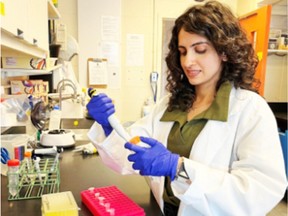"Liquid Biopsy" Cancer Blood Tests
"Unfortunately, people with metastatic breast cancer don't have a good prognosis -- so there is no time to waste wen it comes to determining their most effective course of treatment.""We are giving [oncologists] a tool that allows them to make an informed decision that ultimately leads to a better outcome and a higher quality of life for patients."Irsa Wiginton, researcher, co-founder, mDetect"[Oncologists] are really very blind to what they are doing. It takes a long time to get results from CT scans.""You don't want to wait three months on a drug that is doing you no good and has toxic side-effects.""I think one of the big things is that we are really going to reduce the side-effects that women are experiencing.""If we can do that, they are going to have a better quality of life."Chris Mueller, senior scientist, professor, Cancer Research Institute, Queen's University. President, founder mDetect
 |
Researchers at a laboratory in Kingston, Ontario have developed a blood test they believe can save breast cancer patients from unnecessary tests and treatment, which would allow their doctors to more quickly select a therapy that would be most effective in their treatment. A clinical trial is in the process of being set up that will begin once patients with metastatic breast cancer have been recruited for the trial to proceed meant to measure the efficacy of the "liquid biopsy" blood test.
Should the test be approved it has the potential to extend the lives of metastatic breast cancer patients while improving their quality of life. At the present time oncologists make use of CT scans to determine whether treatment of a specific kind for metastatic breast cancer is effective. CT scans deliver greater doses of radiation than do X-rays and are used sparingly, leaving patients and oncologists no option but to wait some three months following treatment initiation to determine whether it is successful.
This caution results in an 18- to 24-month gap in cycling between potentially successful treatments before the most effective one is determined for individual patients. The "liquid biopsy" blood test, on the other hand is minimally invasive and could be in use only weeks following treatment initiation, allowing oncologists to more efficiently shift to another treatment in their quest to discover the most effective one for their patients. A process that would prevent months of patients on harsh therapies that fail to work for them.
 |
| Researchers at Queen’s University have developed a more sensitive means of detecting and monitoring the presence of cancer. This innovative and cost effective test, researchers say, may lead to earlier cancer detection, including relapse. |
Researchers are anticipating that 150 patients from Kingston and The Ottawa Hospital will agree to participate in the clinical trial which could span a three-year period. Oncologists will be engaged to assist in the enrolment of patients whose illness falls within the category of the clinical trial's parameters for the research to commence and follow their treatment over time. In return, researchers should expect to identify indications of how well the test works, in comparison to CT scans.
DNA in blood indicating whether metastatic breast cancer is growing or shrinking is measured by the test. Liquid biopsies in development represent an expanding field which would encompass other cancers, including the monitoring of lung cancer. Should clinical trial findings be seen as positive, the next move would be obtaining approval for use in hospitals.
![[Photo of Lauren Michelberger processing a blood sample from the lung cancer mDETECT project, PIPEN]](https://www.queensu.ca/gazette/sites/default/files/assets/stories/2020/Michelberger_1000x667.jpg) |
| Lauren Michelberger, fourth-year thesis student in biochemistry, processing a blood sample from the lung cancer mDETECT project, PIPEN. (Supplied photo.) |
Labels: Blood Tests, Metastatic Breast Cancer, Research, Treatment Options

0 Comments:
Post a Comment
<< Home